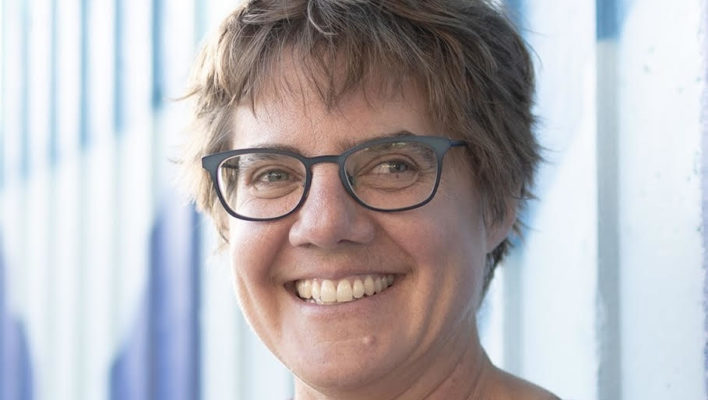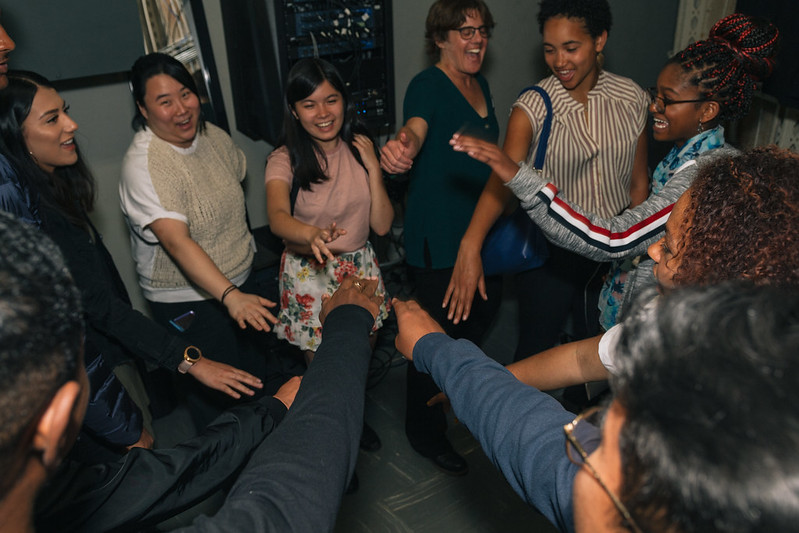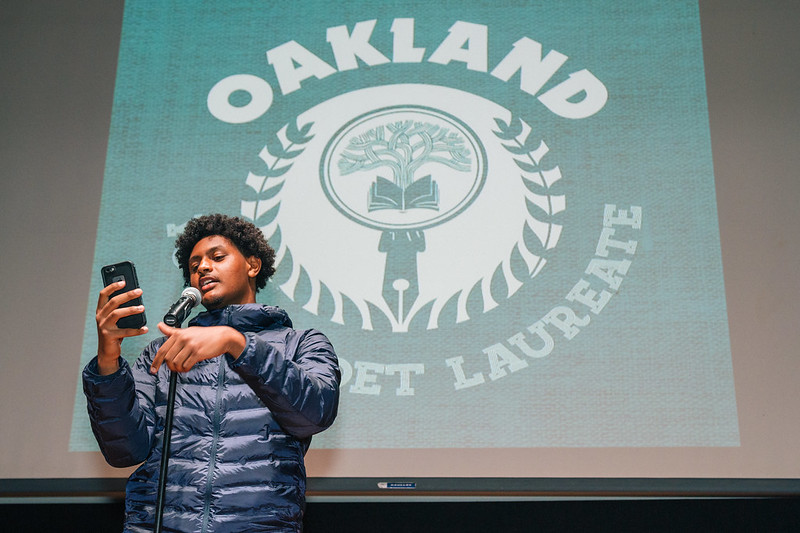On young people and libraries

In conversation with Peggy Simmons
Information holds great value; with the proliferation of online content, you can discover almost anything virtually. Thinking about libraries, they might seem a bit outdated with the older models of computers perched on desks and the many shelves of books stacked up from a long ago era. However, some pieces of information are not digitised; some books are rare; and one must not silence history in order to advance the future. Libraries are not just the bearers of books but also a safe zone that can provide comfort to a community. A warm space in the winter, a water source in the summer. A place to find answers, and a space to belong.
Caitlin Sibthorpe interviewed Peggy Simmons about libraries, her poet laureate programme, and societal shifts in the USA. Peggy is a longstanding member of ATD Fourth World, as well as a writer, youth worker and library assistant.
Where did you grow up? Can you share some of your journey?
I grew up in Southern California in a stereotypical suburb where all the houses looked the same. I was bored and I didn’t like what I was seeing around me either so I was looking for ways out. When I was sixteen I became an exchange student in an isolated part of New Zealand with a working class family. It completely changed my way of thinking. I realised there were lots of ways to live a good life, I had been told to get good grades, to go to the best school possible, etc., but then I realised there are other ways to live a good life.
Did this lead you to ATD?
It started my lifelong journey of curiosity of trying to understand how other people live. I did more studying abroad, and then in 1992 I did an internship with ATD Fourth World in Washington, DC. I then joined ATD’s full-time International Volunteer Corps: that was my education. I never finished university, I did not want to be taught in that way. I learnt better by experiencing things than being told what to think. ATD Fourth World was a great place to learn about other lives. I was full-time with ATD for over seven years in various locations.
I joined ATD’s international youth movement. It was amazing to be working with young people from different backgrounds and experiences, and seeing how they could come together when they had a common purpose. After five years of that, I wanted to come back to my own country and do that same learning with young people. I was really shocked by how many organisations who worked with teenagers were condescending and patronising to younger people who had hard lives. Rather than finding ways to help them achieve all they could achieve, it was more the case of, ‘oh he lives in the bad part of town let’s make it easier for him’. It did not accomplish anything.
Future paths
I always wonder if those organisations could provide some kind of aid whilst thinking of how to help the future of these young people…
I think it needs to be individualised: what does this young person need to get to their next goal?
The trouble is people don’t have enough time, also everything is grant funded so you must show outcomes.
For example, you need to show what has happened within six months to deserve the money. What ends up happening is organisations go to schools in the poorest neighbourhood but will only work with the highest achieving kids as then they can show their outcomes.
However, I found a couple organisations that did want to work authentically with teenagers. One of them was The Beat Within an organisation that does writing workshops with kids in juvenile halls (youth prisons) and then publishes the writing in a magazine. The person who founded this organisation (David Inocencio) recently passed away. It started in the San Francisco Bay area and now it is all over the country. I stopped working with them a couple of years ago. The other organisation I found that works with youth authentically is the Oakland Public Library, I have been there for fourteen years.
Can you tell me about the importance of the library?
The importance of libraries is that they are a place to go to…. That’s almost it.
Nothing is expected of you, no one is asking you to produce anything, or to talk to anybody. In our library there is a whole corner of the floor that is for teenagers. There has been a lot of work done to make sure teenagers feel comfortable. Naturally teenagers get loud and have a lot of energy and that can disturb other parts of the library. Many adults are scared of teenagers, especially if they are wearing a hoodie or have tattoos. There is a lot of fear for no reason. This fear exemplifies what has become a bigger problem for libraries that has grown over the years, and post-pandemic it has reached a critical point. There are many people living on the streets here, and libraries have become the only place for people to just be during the day. There are bathrooms, access to water. You can ask questions, and people working in the libraries will bend over backwards to find resources, but there is a shortage of resources.

Please can you share some of the challenges faced?
People come in with a lot of stress, trauma, and mental health and drug challenges. There is a huge discussion happening at my library about the system I am in. There are librarians who work there who explain that they were not trained for this and they do not want to do this. There are others who think, ‘Wow, what an amazing opportunity, libraries can reach people nobody can, they are all over the cities, look at what we can do, we can really help. They welcome the support.’ So there’s this huge conflict. It is happening at libraries all over the country, especially in urban public libraries.
It’s a failing of society if the library is the only place where folks can go if they are having trouble and we are totally unprepared for it.
What happened during the pandemic?
When the pandemic hit, we as city workers were called in to do disaster service work where, whenever there is a crisis, as public employees, we can be asked to help. During the pandemic, my colleagues were doing food distribution. A friend of mine who is a librarian in another system was put in charge of putting people who were living on the streets in hotels. Sadly, young people were left out of the help, apart from the youth poet laureate programme. [See more details about this below.].
Library dilemmas
In the UK, libraries are closing down. Is this a problem occurring across the US too?
We have been able to hang on to the libraries that we have. It often comes up that there is a budget crisis, but the community does rally around, which is great. Though, these people who rally tend to want the library for the books, as opposed to seeing it as a vital part of community strength; again this causes conflicts.
Another thing that happened in the pandemic was that the part of the public who could be loud to the city council, those who were rallying, were demanding access to the books inside the library, so we started a service on the sidewalks of letting them place holds on books, even while we couldn’t allow the public to enter. That was such a huge endeavour to maintain and to staff. I thought personally that it was more important to support teenagers, helping them with school work and giving access to the internet, but we did not have the manpower for this.
So libraries aren’t closing down, but there are dilemmas within the library systems?
There is a challenge unmet: libraries have to serve a community with so many problems and library schools are not training/teaching people what they need to know to go into public service in urban areas.
I think we need to reconceive what libraries are, and there needs to be more positions than just library positions. The Enoch Pratt Library in Baltimore have reconceived what the roles are in a library: it is much more community facing; it is about supporting the community and it is about outreach.
What is Oakland as an area like?
Until recently, Oakland is the cheaper alternative to San Francisco, now I think it’s just as expensive. It has a reputation for violence, homicide and for gangs. There are certain parts of Oakland that have been destitute for decades. It can be very dangerous; teenagers in these areas can be easily caught up in difficult situations. Though the reputation is far worse than how it actually is. There are pockets that have a lot of money too. Over the past decade, it has been a place to come for good food and nightlife. There are many problems here: poverty, violence, low literacy rates, and it is very racially divided. But it has had amazing reactions to those problems. The Black Panthers started in Oakland; restorative justice in schools around this country is based on an organisation here called RJOY. It was started by Fania Davis (Angela Davis’s sister).
The poet laureate programme
An area with great social change–speaking of which, the next generation can anchor change…. You mentioned earlier the Youth Poet Laureate programme at the library. Zouhair Mussa did a fantastic poem for our virtual poetry jam in 2021. I was wondering if you could tell us more about the poet laureate programme and then about Zouhair?
In 2011, the Oakland Youth Poet Laureate programme started. It’s a contest where teenage poets compete to be named laureate, then they gain a scholarship and will serve the city for a year with their poetry. It has grown over the years to be a community of young poets. One person is a winner, but people in the final get some money and opportunities to take part in other events all around town. We get booking requests for poets to come and perform and do workshops in different places. Also, purposefully we build them as a cohort too so they can support each other as poets, artists, and leaders. The process of the competition is looking for people who are interested in social justice work and in making positive change. We have managed to develop it so we get people from different parts of town.
Unseen sensitivity
When Zou was around 17 he came into the programme. His friend Damien introduced him. One of the things Damien loved about writing poetry was that he could help his friends understand emotions by him writing about what himself and his friends were going through. Zou is from West Oakland, one of the parts of town with the least resources and worst reputations. The way I see him is this tall black man who has this sensitivity that leads to great poetry; but people don’t see this sensitivity in him without the poetry. I think that is something that he has to reckon with a lot. He is a kind person and an amazing poet.

Why is it vital to provide young people with opportunities in public spaces such as libraries?
Young people have more of a capacity to cross the lines that we draw between ourselves and other people, if given the right space and the opportunity. They are united as young people. All the barriers between them come down fairly easily, I love seeing their curiosity of each other and how they support each other. As you grow older, this capacity can get lost in one’s psyche. I have believed this for thirty years: that there is something to learn from young people that we need to listen to, to make the world a better place for humanity and for the earth.
There is something about young people’s sense of justice, their ability to be forthright when given the right space to be honest and authentic. I feel that humanity is slowly evolving in a good way. It is a wonderful evolution that we need to learn from. Poetry is one of the best ways for adults to listen to young people. If you hear their poetry, people become impacted in an emotional way.
I see youth poetry as a change maker.

